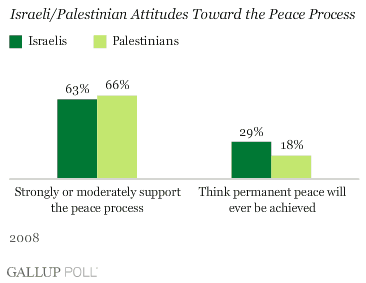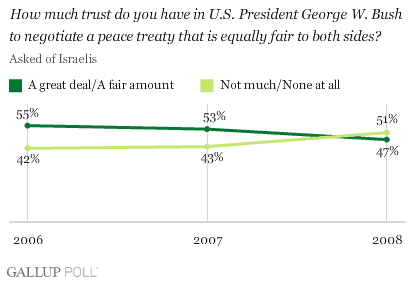Issue at Hand: The Israeli-Palestinian conflict. Much of the tension among Middle Eastern populations, and between the Arab world and the West, still revolves around this seemingly intractable dispute.
The Bush administration has abandoned its goal of reaching some kind of peace agreement by the end of 2008, but it is still pushing to preserve the framework for a deal laid out at the November 2007 peace summit in Annapolis, Maryland.
Complicating the issue is a leadership crisis in Israel: Prime Minister Ehud Olmert resigned in the face of a corruption scandal and is serving as interim prime minister until an election takes place in February 2009. Leadership in the Palestinian Territories is also unsettled, as the internal Hamas-Fatah conflict has split the Palestinian community and its government.
Obama's Stance: During a weeklong swing through the Middle East in July, Obama stated his intent to work for a breakthrough in peace negotiations from day one of his administration. But with the global financial crisis taking center stage and unresolved leadership questions on both sides of the negotiating table, it's unclear how quickly progress can be made.
It's also unclear how willing Obama's administration will be adhere to the approach the Bush administration took in Annapolis, particularly given that several of the president-elect's foreign policy advisers were active in the Clinton administration's more hands-on negotiations. Some Israelis fear a more activist approach could ratchet up the pressure to make concessions to the Palestinians. For their part, Palestinian leaders' early enthusiasm for Obama was dampened by his statements in June that Jerusalem should remain the undivided capital of Israel and that he would defend Israel's security first and foremost.
Israeli/Palestinian Views on the Peace Process: The decades-long conflict has taken a profound toll on optimism among Israelis and Palestinians. Rarely has grassroots pressure from moderates on either side forced leaders to stay focused on ending the conflict. The deep-seated mistrust each side has for the other helps explain that -- particularly since Hamas swept the Palestinian parliamentary election in January 2006. On the other hand, Gallup's 2008 polls found that about two-thirds of Israelis (63%) and Palestinians (66%) "strongly" or "moderately" support the peace process.
Another likely factor in the lack of activism among moderates is the fatalistic view that prevails among both populations: Just 29% of Israelis and 18% of Palestinians think permanent peace will ever be achieved between the two sides. Offering the general public on both sides new reasons to believe the peace process can actually succeed could help ramp up the popular pressure needed to sustain its momentum.

Obama Administration as Peace Broker: The weakness of current leaders on both sides of the conflict is evident in their low levels of popular support. Just 37% of Israelis said in the aftermath of Olmert's resignation that they approve of their country's leadership; similarly, just 39% of Palestinians said last September they approve of their own leaders. The perceived lack of credibility will make lasting compromise difficult. However, it may also present an opportunity for Obama's foreign policy team to emerge as strong leaders in the process right from the start -- particularly if Sen. Hillary Clinton, no stranger to the international stage, is at the helm as secretary of state.
One problem U.S. presidents have faced in their efforts to broker a peace deal is a lack of faith among Palestinians. George W. Bush has been no exception; in 2007, 95% of Palestinians said they had an "unfavorable" or "very unfavorable" opinion of Bush. However, confidence has also been wavering among Israelis; in 2008, those who said they had a "great deal" or a "fair amount" of trust in Bush to negotiate a fair treaty were slightly outnumbered by those who said they have "not much" trust in Bush or "none at all."

There's little reason to think Israelis will wholeheartedly embrace a new approach by Obama -- when asked in October which candidate they preferred to win the U.S. election, they gave Sen. John McCain a slight edge at 38% vs. 34% for Obama.
However, Israelis' ambivalence implies that a strong show of opposition to the Obama administration's efforts is unlikely. What's more, there may be a historic opportunity to establish firmer footing for the peace process if favorability toward the Obama administration is less skewed to one side of the conflict than has been the case for other U.S. presidents. There is some evidence for this: Among Palestinians and several other Arab populations surveyed during the U.S. election campaign, Obama supporters outnumbered McCain supporters by 3 to 1.
Policy Implications: Among Israelis and Palestinians, strong majorities support peace in principle. But most have no vision of a peaceful future, which may sap their will to participate in populist peace initiatives. The Obama administration may have some opportunity to affect that mind-set; the presence of a powerful moderator with strong international support and more balanced favorability between the two populations could shift the dynamics enough to spark renewed optimism.
However, it is also possible that the two populations are so skeptical that any boost in optimism is likely to be short-lived unless it is quickly channeled toward opportunities for active involvement. Toward that end, Obama -- whose presidential campaign proved unmatched at mobilizing grassroots support -- may do well to seek out leaders of grassroots peace initiatives on both sides and support their efforts to engage anyone who may see more reason to think they can influence the future.
Survey Methods
Results based on in-person interviews with 1,000 Palestinian residents, aged 15 and older, conducted in August 2008, and 1,000 Israeli residents, aged 15 and older, conducted September-October 2008. For results based on the total sample of national adults in each survey, one can say with 95% confidence that the maximum margin of sampling error is ±4 percentage points. In addition to sampling error, question wording and practical difficulties in conducting surveys can introduce error or bias into the findings of public opinion polls.
